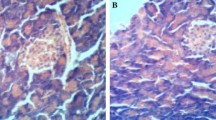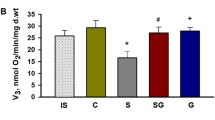Summary.
Streptozotocin (STZ) is a diabetogenic drug that disrupts glucose and energy metabolism in brain. To study its effect on brain lipids, tissue concentrations of free fatty acids and phospholipids were measured in the temporal cortex and the hippocampus of adult rats 3 weeks after a single intracerebroventricular (icv) injection of STZ. STZ increased concentrations of palmitic acid and stearic acid in temporal cortex and these of arachidonic acid both in the anterior part of the hippocampus and in CA1. In addition, palmitic acid and stearic acid concentrations were elevated in the anterior hippocampus. In contrast, STZ decreased brain cortex levels of phosphatidylethanolamine and phosphatidylserine. These data show that STZ alters brain lipid metabolism. They suggest that oxidative phospholipid breakdown is accelerated by STZ. These changes may be related to decreased brain glucose utilization and energy formation.
Similar content being viewed by others
Author information
Authors and Affiliations
Additional information
Received December 18, 1996; Accepted April 30, 1998
Rights and permissions
About this article
Cite this article
Müller, D., Nitsch, R., Wurtman, R. et al. Streptozotocin increases free fatty acids and decreases phospholipids in rat brain. J Neural Transm 105, 1271–1281 (1998). https://doi.org/10.1007/s007020050130
Issue Date:
DOI: https://doi.org/10.1007/s007020050130




